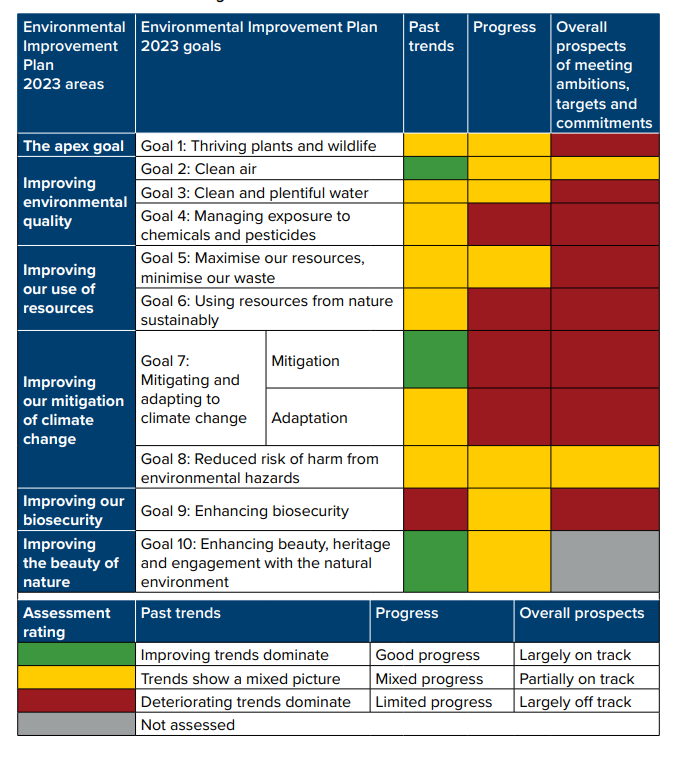The Office for Environmental Protection (OEP) has found that the vast majority of the UK government’s own environmental ambitions are largely off track in its latest annual report. As our planet faces a triple planetary crisis in biodiversity loss, climate and chemical pollution ensuring environmental protections are in place and enforced has never been more critical to the long-term health of people and the planet. The OEP report shines a light on chemical and pesticide exposure in the UK and the inability of the government to meet key commitments, statutory targets and its own ambitions.

Table 1 from OEP Progress Report showing UK government environment goals most of which have not been met
Who are the OEP?
The Office for Environmental Protection (OEP) is a relatively new public body required by the Environment Act 2021 to hold the Government in Westminster to account on its environmental laws. As part of this overarching objective, it keeps a close eye on the UK Government’s environmental policies including the long term targets required by the Environment Act and the interim targets within the Government’s Environmental Improvement Plan. Each year OEP carefully examines and reports on the Government’s progress. The most recent report (on the year 2022- 2023) has found the UK government is woefully behind on addressing a range of issues including chemical pollution, with the government unlikely to meet its ambitions in the future.
Why isn’t the UK Government meeting its ambitions on chemical pollution?
The government’s ambition, as laid out in the 2018 25-year Environment Act, is to ‘ Make sure that chemicals are safely used and managed, and that the levels of harmful chemicals entering the environment (including through agriculture) are significantly reduced.’ The OEP’s analysis of progress in this area is that the government is off track.
The OEP notes that while emissions of a few well known and regulated chemical have decreased the large majority of chemical are not monitored and impacts are unknown. This means that the total chemical burden on the environment and human health is unlikely to reduce.
The lack of a chemical strategy and regulation impacting policy and pollution
Further development of a UK policy and regulatory framework is a stated priority for the government. However, the pace of progress means that key strategies, policies and regulatory frameworks are still to be delivered.
The Chemical Strategy that Fidra has been calling for since 2018 is yet to be consulted on and delivered. Despite being re-promised in the Environment Improvement Plan the government’s own deadline has been missed again. Fidra and NGOs have been calling for the government to integrate 12 Key Asks into the government’s strategy to ensure it protects health and environment. The National Action Plan for Pesticides is also significantly delayed and has yet to be delivered. These are the basic policy architecture required to set direction and develop clear timebound delivery plans.
Poor resourcing for addressing chemical pollution in the UK
Current resources, skills and expertise are identified by OEP as being inadequate to deliver the actions at the pace needed to ensure an integrated approach to chemicals governance across government and with delivery and partners. Without adequate resources and expertise government cannot register, restrict or manage chemicals on the UK market. Leaving UK consumers and the environment vulnerable to chemicals of concern, some of which have already been banned in other parts of the world.
The report also identifies the need to improve evidence gathering on the environmental impacts of chemicals. This will help ensure improved focus and monitoring of chemical pollution to the environment. Currently few chemicals are routinely monitored in the environment, those that are monitored are often already restricted and have statutory environmental limits. Further screening is needed to identify chemicals of concern, track long-term trends and monitor the chemicals in environment, in wildlife and in the UK population.
Life cycle of chemicals in a circular economy
As we move to circular economy where we repair, reuse and recycle by default, we need to make sure chemicals of concern are not locked into recycled products or act as a barrier to safe recycling. Fidra have been raising the issue of harmful chemicals, lack of transparency in the life cycle of chemicals and the need for a reduction in the use of harmful chemicals in everyday products to ensure a safe circular economy. The OEP report reiterates that the government should ‘consider the whole life cycle of chemicals, foster innovation and support a circular economy where products are safe by design’.
Urgent action needed to address UK chemical pollution
The OEP Head of Assessments Dr Cathy Maguire says for the government to meet its goals ‘This will take a shift in emphasis from visions and goals to polices and actions and a focus on delivery’.
Assurances and ambitions are no longer enough. We clearly need to see positive and urgent action, rigorous milestones that are met, driven by effective governance and good leadership with the OEP warning that the government is unlikely to meet its own environmental ambitions and statutory targets in the future it is clear major reform is needed. This includes the need for increased resources, expertise and efficient legal frameworks so the UK can restrict groups of harmful chemicals that are building in our environment. A good place for the government to begin demonstrating this change is to deliver a Chemical Strategy that integrates our 12 Key Asks to ensure effective protection for UK citizens, wildlife and environment from harmful chemicals.
